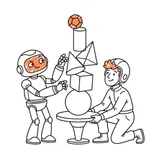AI agents work when they fit your process, not replace it
Block and GSK show successful AI agents adapt to existing workflows rather than forcing teams to rebuild around technology. The key is making AI feel invisible while amplifying human expertise.

The AI agent hype assumes enterprises need to rebuild around AI. Block and GSK prove successful AI adapts to how people already work.
Block's Goose platform writes 90% of code for 4,000 engineers, saving 10 hours weekly. The interface design is more important than the technical achievement. Engineers interact through natural language requests that feel like delegating to a colleague, making programming conversational. Goose manages code generation, debugging, and tool integration behind this intuitive layer. GSK applies similar ideas to drug discovery, using agents to query large scientific datasets and surface research hypotheses. Their approach combines domain-specific language models with existing ontologies and research frameworks while building on established methods.
Both companies discovered the same bottleneck: process integration, more than technical capability. As Block's Brad Axen put it, you can't just give people a tool and tell them to make it work for them Agents need to reflect existing employee workflows and integrate with current practices.
This matters for legal teams because it shifts the focus of the adoption question. Think about how to design AI that enhances existing expertise and strengthens established practices. The companies that succeed with AI agents focus on making AI seamless while empowering their teams.

